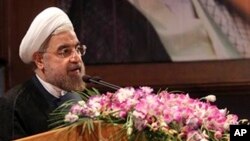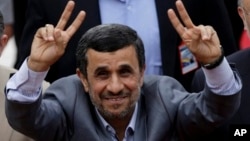This Sunday Iran will trade an abrasive diplomatic embarrassment for a far more presentable figure.
After eight years of Mahmoud Ahmadinejad, almost anyone would look good by comparison. Still, the new president, Hassan Rouhani, a Scottish-educated cleric, comes equipped with personal qualities, experience and relationships that could help stem Iran’s slide into economic crisis and international isolation.
“His main point is to rectify the mess resulting from the last eight years, i.e. damage control,” said Eskandar Sadeghi-Boroujerdi, a researcher of modern Iranian political history at Queen's College, Oxford.
Boroujerdi, like many other Iran watchers, is “cautiously hopeful” that Rouhani can turn things around or at least prevent the situation from getting worse.
Rouhani’s first priority is stabilizing the Iranian economy. That, in turn, requires that he de-escalate the nuclear crisis with the West to prevent the imposition of new economic sanctions and obtain relief from some of those already imposed.
Rouhani will face enormous obstacles, both domestically and internationally. But there are at least four reasons why he might succeed where Ahmadinejad failed:
A less contentious election
Rouhani can point to a far less contentious election. He scored more than 50 percent of the votes June 14 in a field of a half dozen carefully vetted candidates. Unlike 2009, when millions of Iranians came out to protest allegations of fraud, this time, they celebrated and appeared to interpret the Rouhani win as belated acknowledgement of their thwarted hopes for change four years ago.
While many Iranians would like Rouhani to relax restrictions on civil society and free political prisoners, the new president’s main focus will be on the economy. Here, the challenges he confronts are as formidable as any Iran has experienced since the early days of the 1979 revolution and the 1980-88 Iran-Iraq war. Iran’s economy has been in recession for the past two years, oil exports are less than half what they were two years ago and inflation is above 40 percent. Iranian factories are closing for lack of imported components; the latest US sanctions, which went into effect July 1, are forcing foreign automotive firms to stop selling kits and parts to Iranian companies. As a result, more than 120,000 automotive workers have lost their jobs over the past year.
Many Iranians are struggling to put food on the table and even to find medicine, in part because of high inflation, corruption and government mismanagement, but also because of U.S.-led sanctions. While the sanctions contain so-called humanitarian exemptions, bans on Iranian banks and on transfers of funds to and from Iran have caused foreign suppliers to flee the Iranian market. On July 26, the U.S. Treasury Department expanded a list of medical devices that can be exported without a license and advised foreign companies that they can legally be paid for humanitarian exports to Iran from non-sanctioned Iranian banks and external accounts of Iran’s Central Bank. Without an authorized U.S. banking channel to Iran or relief of sanctions on insuring shipments to Iran, however, it may be difficult to alleviate the shortages.
The nuclear talks deadlock
By replacing Ahmadinejad cronies with competent technocrats, Rouhani can alleviate some of these problems. But his presidency will likely be judged on whether he can end the deadlock in nuclear talks with the five permanent members of the U.N. Security Council plus Germany, which are expected to resume early in the fall.
Rouhani has consistently stressed that Iran has a right to enrich uranium, in return for measures to assure the world that Iran is not seeking to make nuclear weapons. He has offered to increase access to Iran’s nuclear facilities going so far as to write, in a letter to Time magazine in 2006, that Iran would be willing to agree “on terms of the continuous presence of inspectors in Iran to verify credibly that no diversion [of enriched uranium] takes place.”
U.S. reaction to Rouhani’s win has been cautious, with officials saying that Washington has no intention of pre-emptively improving a prior offer that demands significant Iranian concessions in return for lifting sanctions on trade in precious metals and petrochemicals. In a conference call with reporters last week, Assistant Secretary of State Brett McGurk said, “we see the election as a clear expression of the Iranian people’s desire for change [and] are hopeful that will result in policy changes by the Iranian government.”
For progress to occur, however, the United States will also have to show flexibility – and Congress curb its appetite for new sanctions.
As Boroujerdi put it, “Rouhani cannot do it alone obviously. It will take a bit of time and behind the scenes lobbying and plenty of assurances regarding the terms.”
Click on Barbara Slavin's name below to view her previous columns.
After eight years of Mahmoud Ahmadinejad, almost anyone would look good by comparison. Still, the new president, Hassan Rouhani, a Scottish-educated cleric, comes equipped with personal qualities, experience and relationships that could help stem Iran’s slide into economic crisis and international isolation.
“His main point is to rectify the mess resulting from the last eight years, i.e. damage control,” said Eskandar Sadeghi-Boroujerdi, a researcher of modern Iranian political history at Queen's College, Oxford.
Boroujerdi, like many other Iran watchers, is “cautiously hopeful” that Rouhani can turn things around or at least prevent the situation from getting worse.
Rouhani’s first priority is stabilizing the Iranian economy. That, in turn, requires that he de-escalate the nuclear crisis with the West to prevent the imposition of new economic sanctions and obtain relief from some of those already imposed.
Rouhani will face enormous obstacles, both domestically and internationally. But there are at least four reasons why he might succeed where Ahmadinejad failed:
- The 64-year-old cleric is a regime insider who has represented Supreme Leader Ali Khamenei on Iran’s Supreme Council of National Security for 23 years and headed the council for 16 years. Precisely because of this background, Rouhani knows what the supreme leader can and cannot accept and has real influence with him. In 2003, while Rouhani was negotiating with Britain, France and Germany, he persuaded Khamenei to suspend elements of Iran’s uranium enrichment program. Rouhani is also believed to have played a major role in persuading the supreme leader to suspend research into developing nuclear weapons.
- Rouhani has a better chance than his predecessors in bridging the often paralyzing differences among Iranian factions that have doomed previous confidence-building deals with the United States. In addition to his ties to the supreme leader, Rouhani has a very close relationship with former president Akbar Hashemi Rafsanjani and was endorsed by Rafsanjani’s successor, Mohammad Khatami. Rouhani also has an ally in parliament speaker Ali Larijani, who clashed frequently with Ahmadinejad. However, disgruntled hardliners shut out in recent elections may still try to sabotage the new president through human rights abuses or terrorist acts abroad.
- Rouhani understands how deep a hole Iran’s economy is in and that the only way to stop it from getting deeper is to acknowledge the crisis and achieve sanctions relief. Ahmadinejad wouldn’t even admit there was a hole, so he was in no position to stop digging.
- Finally, Rouhani or a close aide – perhaps former U.N. ambassador Mohammad Javad Zarif, a U.S.-educated prospective foreign minister -- will likely be authorized to hold direct talks with the United States on the nuclear issue and other matters. President Barack Obama has said repeatedly that he is ready for such talks. The six-nation process the U.S. inherited from the George W. Bush administration is too unwieldy to produce results. The only tentative accord the U.S. and Iran reached under Obama came in October 2009 when then Undersecretary of State for Political Affairs Bill Burns met for 45 minutes alone in Geneva with chief negotiator Saeed Jalili. The deal fell apart, however, because of Ahmadinejad’s unpopularity following disputed 2009 elections – the other factions accused him of selling out Iran’s interests to bolster his own questionable legitimacy.
A less contentious election
Rouhani can point to a far less contentious election. He scored more than 50 percent of the votes June 14 in a field of a half dozen carefully vetted candidates. Unlike 2009, when millions of Iranians came out to protest allegations of fraud, this time, they celebrated and appeared to interpret the Rouhani win as belated acknowledgement of their thwarted hopes for change four years ago.
While many Iranians would like Rouhani to relax restrictions on civil society and free political prisoners, the new president’s main focus will be on the economy. Here, the challenges he confronts are as formidable as any Iran has experienced since the early days of the 1979 revolution and the 1980-88 Iran-Iraq war. Iran’s economy has been in recession for the past two years, oil exports are less than half what they were two years ago and inflation is above 40 percent. Iranian factories are closing for lack of imported components; the latest US sanctions, which went into effect July 1, are forcing foreign automotive firms to stop selling kits and parts to Iranian companies. As a result, more than 120,000 automotive workers have lost their jobs over the past year.
Many Iranians are struggling to put food on the table and even to find medicine, in part because of high inflation, corruption and government mismanagement, but also because of U.S.-led sanctions. While the sanctions contain so-called humanitarian exemptions, bans on Iranian banks and on transfers of funds to and from Iran have caused foreign suppliers to flee the Iranian market. On July 26, the U.S. Treasury Department expanded a list of medical devices that can be exported without a license and advised foreign companies that they can legally be paid for humanitarian exports to Iran from non-sanctioned Iranian banks and external accounts of Iran’s Central Bank. Without an authorized U.S. banking channel to Iran or relief of sanctions on insuring shipments to Iran, however, it may be difficult to alleviate the shortages.
The nuclear talks deadlock
By replacing Ahmadinejad cronies with competent technocrats, Rouhani can alleviate some of these problems. But his presidency will likely be judged on whether he can end the deadlock in nuclear talks with the five permanent members of the U.N. Security Council plus Germany, which are expected to resume early in the fall.
Rouhani has consistently stressed that Iran has a right to enrich uranium, in return for measures to assure the world that Iran is not seeking to make nuclear weapons. He has offered to increase access to Iran’s nuclear facilities going so far as to write, in a letter to Time magazine in 2006, that Iran would be willing to agree “on terms of the continuous presence of inspectors in Iran to verify credibly that no diversion [of enriched uranium] takes place.”
U.S. reaction to Rouhani’s win has been cautious, with officials saying that Washington has no intention of pre-emptively improving a prior offer that demands significant Iranian concessions in return for lifting sanctions on trade in precious metals and petrochemicals. In a conference call with reporters last week, Assistant Secretary of State Brett McGurk said, “we see the election as a clear expression of the Iranian people’s desire for change [and] are hopeful that will result in policy changes by the Iranian government.”
For progress to occur, however, the United States will also have to show flexibility – and Congress curb its appetite for new sanctions.
As Boroujerdi put it, “Rouhani cannot do it alone obviously. It will take a bit of time and behind the scenes lobbying and plenty of assurances regarding the terms.”
Click on Barbara Slavin's name below to view her previous columns.






